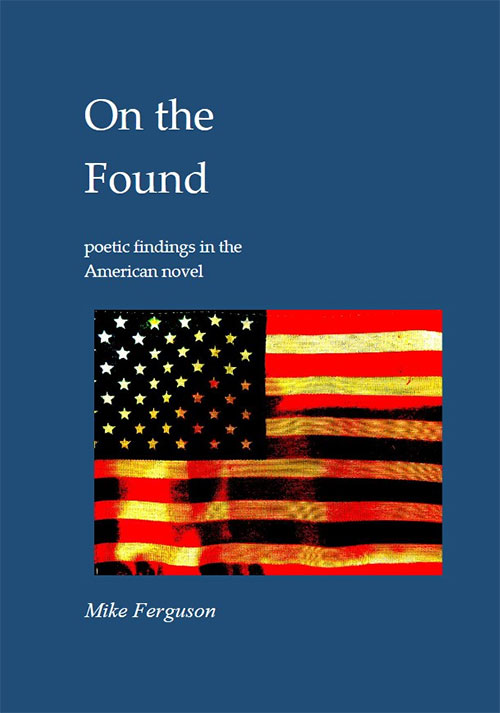
On the Found, Mike Ferguson (Gazebo Gravy Press)
Mike Ferguson hits the found running in the sweet spot between traditional and digital culture, offering 68 witty and creative poems he has constructed or extracted from a tentative canon of the American novel. No waiting on the muse or bullshit about inspiration: Ferguson rolls his sleeves up and fills the bowl with text, mixes it up, adds something random, then abandons the recipe and shapes his work with the mind’s own cookie cutters.
Leave something behind on a recent trip? Fill out the lost property form to report what was lost and we’ll see if someone has turned it in. Make sure you have printed off leaflets and knocked on all the doors in your road, then make sure you’re certain that your original text was just that, not simply a rearrangement of other people’s words or phrases. I mean you can’t complain about losing what wasn’t yours in the first place, that simply wouldn’t be right.
‘The artist formerly known as “author,” therefore, does not, in the imaginary image of the divine creator, produce something out of nothing. She or he is always and already responding to the scene or culture in which one already finds oneself and is, for this reason, responsible only for the manner, method, and means of that particular response.’
– David J. Gunkel, Of Remixology. Ethics and Aesthetics after Remix
Found poetry is a simulator, a stimulator, with the world being viewed through any number of authors’ eyes. Ferguson uncover the mystery that lies within other fictions, secret texts and alternative readings, a census of misconceptions or, as one poem title puts it, ‘Our World Version’. Because this is how we navigate the world and words now, tripping over our own feet as we try to read our phones, watch a film, reply to emails, or drive the car listening to music in the wrong order and letting a machine instruct us on how to get to our destination. Poets usually find their poems in prose written by others.
‘Human behaviour / is poetry’ declares Ferguson via Salinger, or the other way round, which is why poetry is now like human behaviour: confused, bewildered, lost and immediate, as concerned with the now as the then, as engaged with the fragmented and momentary as longevity and big ideas.
a person who was
ever confused
will learn something
when poetry is
Writers collect stuff people find; found poems take existing texts and refashion them, reorder them, and present them as poems. Ezra Found can be visited in any industrial or residential building built or refurbished before the year 2000 but some missing people are never found. Collision investigators are appealing for information because it doesn’t rhyme, and research suggests that authors who sit for more than eight hours a day with no physical activity have a risk of dying similar to that posed by metaphor, assonance, scansion and postmodern theory. The found has been in long term decline since after the Second World War.
‘I found it difficult to find a way to convey my idea and work out how I would explain my poems. I found an enormous collection of language, paragraphs, punctuation and books to sift through. Clearly I wasn’t the only one looking to combine foraged materials with traditional techniques, seek the undiscovered, the classic and the contemporary,’ is the sort of thing Mike Ferguson might have said but didn’t.
He exists to educate, connect and inspire. He believes community and kindness are key ingredients and that poems are forged through the fire of conflict. He is ‘far out / in the / languorous / world’, knows that ‘Artists are / make-believe’. The author is yet to be formally identified but it is believed he is ‘disgracefully diffused’ and possesses ‘a migration of / voices’. His ‘Emptiness / is a guide to / inclusion’, his work ‘a mouthswarm / of the indescribable’. Found is the past tense and past participle of find.
You must report all found poems to the Local Authority warden service by Law. If you wish to keep hold of a found poem then this must be done with permission. We are champions of legendary forgotten makers, can literally find a needle in the haystack, especially if you tell us where it is. We are known to have found meaning anywhere, and make it our business to put your found writing online. ‘If you didn’t want me / I’d go nuts’.
Rupert Loydell
(first published at Tears in the Fence)
